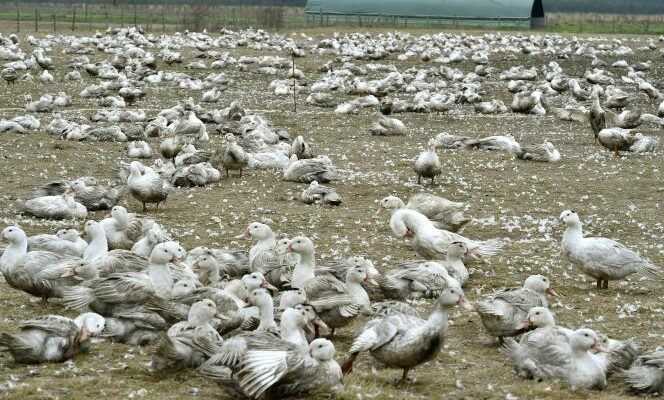“We are on red alert”, declares Marie-Pierre Pé, president of the Interprofessional Committee of Foie Gras Palmipeds (Cifog). On Christmas Eve, when foie gras is at the center of French tables, duck farmers in the South-West are under pressure. Already seven outbreaks of avian influenza have been detected in the region. By adding the eight counted in the Nord department, the counter now displays 15 cases in professional farms on French territory.
The Ministry of Agriculture has formalized the arrival of the H5N1 virus in this sensitive area of foie gras production, Friday, December 17. The first town concerned was that of Manciet, in the Gers. “Then two farms belonging to the same owner, contaminated by the staff, were identified”, explains Mme Pe. So far, four outbreaks have been detected in this department.
The virus, highly pathogenic, also appeared during the weekend in a farm located in Hastingues, in the Landes, as well as in the neighboring town of Came, located in the Pyrénées-Atlantique, where two cases were detected. The avian influenza epizootic is therefore spreading, knowing that most European countries have been contaminated by the virus and that France had already declared 12 cases in wildlife and three in backyards since the summer. The government says the virus is actively circulating through migratory birds.
High stocking density
The Ministry of Agriculture sounded the alarm on November 27 after the first discovery of an outbreak of H5N1 virus infection in a professional farm. The poultry farm concerned, located in the town of Warhem (North), near the Belgian border, had 160,000 laying hens. Other farms were then affected in this department. In total, the veterinary services identify eight, including a farm of 24,000 turkeys and farms of 30,000 to 40,000 chickens.
At present, the South-West is also concerned. However, this region, with its high density of duck farms, has suffered three epizootic episodes since 2015, one of which was very devastating, last winter. Between December 2020 and May 2021, nearly 500 farms had been contaminated and around 3.5 million birds, primarily ducks, had to be eliminated.
During this health crisis, the ax fell on outdoor farms, with the obligation to park animals in buildings. However, exemptions were in order. This time, from November 5, faced with the progression of the epizootic in neighboring countries, the Ministry of Agriculture had set the risk of avian influenza at “high”. A threshold which now forces all farmers to confine their poultry more strictly.
You have 34.85% of this article left to read. The rest is for subscribers only.
